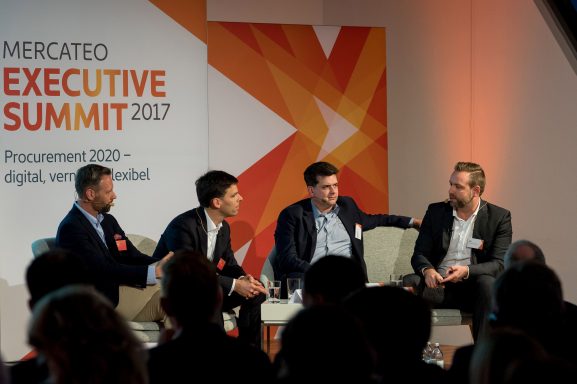The effects of digitalisation on social structures and business processes are currently the subject of controversial debate. This topic was also the focus of the Mercateo Executive Summit, which took place last week at the Humboldt Box by the Berlin Palace. Representatives from science, consulting and politics along with renowned companies agreed – the digital future will place people at the centre of value creation in procurement in a new way.
Automation, blockchain, big data – innovations and optimisation tools are changing companies and company culture. Digital processes ensure greater efficiency throughout the entire value creation chain. Will people be ‘digitalised away’ in the future?
“Machines cannot do everything, even machines have to be operated,” Klaus Pause, an expert in change management and Director of Corporate Solutions at the adidas Group, explained at the Mercateo Executive Summit. “The more that machines take over non-value-creating work from us and reduce possible risks, the more effectively people can resume the central tasks: communication and relationships. This needs to be worked out. Then will no longer need to be feared, but will instead motivate us to develop with it,” Pause is convinced. With this assessment, he offered his experience from positions he has held in various companies in the past. In his view, a company’s employees must also always be won over by digitalisation processes. If this does not happen, such projects are rarely successful.
Mercateo founder Dr. Sebastian Wieser has also concerned himself for many years with the question of how digitalisation and, specifically, platforms can serve people as powerful tools. He presented a simple calculation here: “On a platform, the benefits for the individual grow with the number of users.” Wieser thus described the basic idea behind the new B2B networking platform Mercateo Unite, which was presented that evening to the invited. With the new platform, Mercateo places a focus on the direct relationship between suppliers and purchasers. As a neutral infrastructure, Mercateo Unite is integrated flexibly into the customer’s procurement systems and processes via interfaces. “The interface concept of a platform determines how much scope the users have for their own creative uses and expansions – especially in the world of procurement processes, enormous potential lies dormant here and Mercateo Unite is oriented towards this,” explained Wieser. Users thus have at their disposal a powerful solution that creates capacities for the tasks that will continue to be important in future, too: maintaining personal networks and contacts.
The new platform also attracted international attention with the announcement of the cooperation with SAP Ariba in June this year. The evening’s panelists therefore included Tony Alvarez, Senior Vice President at SAP, who explained why the world’s leading software provider for the procurement of industrial goods and services, SAP Ariba, chose Mercateo Unite as a partner in Europe: “When I saw what Mercateo had to offer with the Unite platform, it resulted in a perfect combination. For purchasers in large companies that use SAP, we would like to offer product ranges with high-quality content so that these can be obtained via our software. Mercateo shares this vision – and offers the same uncomplicated solution for suppliers.”
What advantages the collaboration between the two companies offers to users was explained by Sebastian Englich, Head of Procurement Solutions Excellence at SAP. The purchasing organisation of SAP, with tens of thousands of internal customers, is one of the pilot customers whose ad hoc needs are being met using the new solution Ariba Spot Buy with Mercateo Unite as a partner, before the function is rolled out in the European core countries Germany, France and the United Kingdom from mid-2018. The users of this solution can cover needs more flexibly: “The user can tailor purchase requisitions to his needs and, for instance, choose an optimum price or a better delivery time.”
An assessment that Mercateo director Dr. Bernd Schönwälder confirms: “Standardisation is a big driver in supply chain management and is rightly one of the important strategic components. But digitalisation can and must offer more than standardisation. No creativity is released between computers, but it is between people – this will also result in great value creation in the future. This is what Mercateo Unite relies on: the networking of people beyond supplier and customer organisations.”

